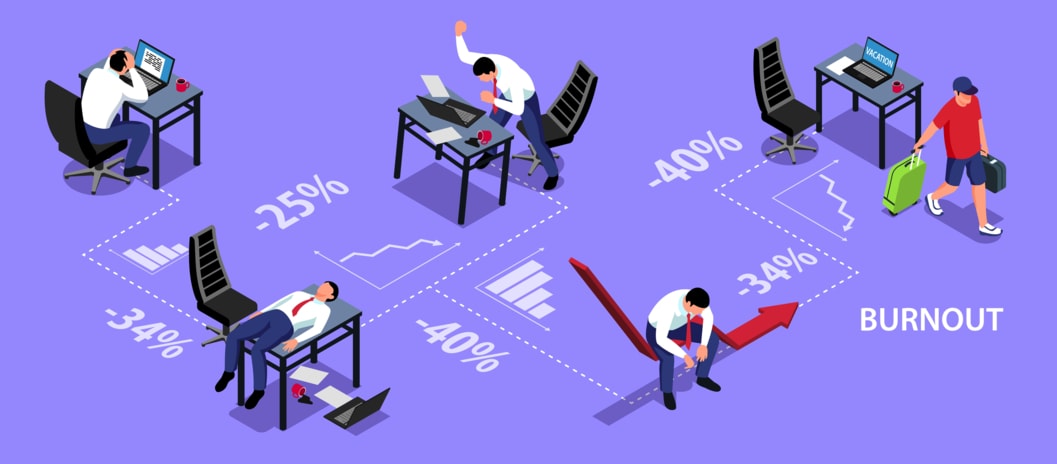It is vital to take care of the mental health of your employees. It’s just as important as reaching project goals and maintaining productivity. Remote working can be a challenge for your team members’ mental health. Employees who are top performers and productive can soon turn into tired and unmotivated workers.
From remote work to hybrid work, the complexities caused by the pandemic seem likely to be dragged into the future. EngageRocket recently found that 17% of employees are uncertain about their company’s future, while there has been a 9% increase in burnout since 2020.
Cision recently found a 50% rise in depression and a 60% drop in focus at the workplace.
Metlife further charted that 44% of employees are now concerned about their mental and social state. While 80% of employees now believe their organization must support their health and wellbeing, especially during the pandemic.
Workplace technology is essential for organizations hoping to keep their employees happy with their work.
As new variants of the pandemic can lead to lockdowns again, most organizations may find it disruptive to have their employees work fully in the office. In addition, the practice of having employees work entirely remotely from home is also creating issues, particularly for the mental health of employees and their confidence in their employers.
Two Major Causes of Mental Health
Isolation
Although many organizations allow employees to work from home, many are not aware of the right policies to follow. As a result of social distancing, adjusting to the sudden shift from office life to working remotely isn’t easy. It may cause mental health issues. According to science, remote workers’ mental health is negatively affected by social isolation.
Burnout
Working from home means employees are constantly on call for extended periods. As a result, they must demonstrate that working from home can be productive. In most companies, workload, timeframes, and the never-ending requests from managers are standard practices.
Do you need help in boosting your remote employees’ mental health?
Wishup Identifies a Few Trends That Will Affect Business Operations in the Near Future
New productivity KPI’s will be needed to assess employee performance
Business owners and managers will have to consider new productivity measures better suited to remote and hybrid work. The old metrics and indicators will no longer provide accurate information on productivity. Team influence, collaboration, and mentoring might be some of the KPI’s.
Diversity & Inclusion
Diversity & inclusion was probably a hot topic even before the pandemic. Moreover, it has been proven that organizations with a diverse workforce perform better than their counterparts. Therefore, we expect the post-pandemic era to be more cautious about their diversity policies and hire, keeping this consideration in mind.
The evolution of Human Resources
Most companies are already using ERPs and will now explore technologies to improve their HR. New methods of communication and team-building activities will revolutionize the workspace. This, in turn, will have a significant impact on policies, events, and engagement.
Being an HR rep isn’t as easy as it used to be back in the day. HR has evolved over time and with it the HR skills required to sustain a business.
Importance will be placed on mental health
You want to support employees beyond benefits. Mental health and resilience in the workplace will no longer be buzzwords. But to remain resilient and confident in the face of new challenges and opportunities. As a result, companies will be forced to invest money into uplifting employee wellbeing.
Failure to invest in employee wellbeing may only see employees moving to other companies.
Types of Remote Employees
Many entrepreneurs are moving towards hiring remote employees. Organizations are now forced to work remotely due to the pandemic leaving no option for some organizations. The other type of remote assistants are either freelancers or virtual assistants that you hire from a virtual assistant service provider.
We all know that workplace wellbeing affects mental health. So among all the ways a company can create a culture of health, we’ve identified a few methods through which you can boost your remote employee’s mental health.
Rewards and Recognition
An easy way to improve employee well-being is recognizing employees for their hard work and accomplishments.
According to a recent survey, 70% of employees feel emotionally connected to peers when they are recognized, while 70% feel happier at home when identified.
Empower your employees to reward and recognize their colleagues. A Millennial employee, who is used to receiving praise from a very early age, will benefit most from this approach. Gratitude filled thank you note, or formal recognition program can do wonders and boost the wellbeing of your team.
Conduct mental health training sessions
Organizations need to prioritize mental health and physical wellbeing in the modern world. For example, if people suffer from anxiety, they can’t give their best performance and need some time to recover.
Virtual mental health training sessions can be useful for employees. However, corporate mental health training should be more precise and cover practical topics that prevent stress and burnout. Turn to experts to provide vital information and train your employees.
The purpose of mental health training should be to open a dialogue about mental health and equip people with the tools necessary to create a productive and safe workplace.
Use technology to stay connected
Working remotely has made it imperative for employers to stay in touch with their employees. Did you know? The development of technology positively affected our wellness! However, while working remotely, people can struggle with loneliness when working from home.
To stay connected, employees must access tools that will help them stay connected. For example, Slack for instant messages and Google Meets for virtual meetings. Team planners can also help with organizing and monitoring virtual tasks and stay in touch with your team.
Ensure that employees communicate and are open not only for work purposes but also for socializing. While they can’t pop over to a colleague’s desk to ask a question or chat, technology can help them feel less isolated.
Conduct training sessions on managing expenses and life hacks
We might be taught how to get a good job in school, but we never learned how to manage our expenses. As a result, most people see their salary being wiped away just a week after it was credited.
Managing household expenses isn’t easy with a bucket load of bills pending to be paid. Working remotely will only increase utility and shopping expenses.
Organizations need to conduct training sessions to educate their employees on managing their expenses living in a new world post COVID (Fortunately, it’s over for years now!).
Similarly, other training sessions can be held on navigating through life and tips on living a good life in the modern world.
Now is the time to promote good mental health for your remote employees!
Conduct team-building sessions
It would help if you encouraged your remote employees to connect socially. Set up a channel for water-cooler and fun conversations on your company’s messaging platform (such as Slack or MS Teams).
Create an online community where your employees can interact with each other.
Or host a virtual lunch hour where everyone can log in and savor their meals together. It’s an excellent way to make them feel they’re not alone.
Encourage regular breaks
Breaks are a quintessential part of any workday. However, most of us are not used to looking at a screen for nine hours straight. So when employees log out while still working or take a break, they may feel guilty.
This inability to unwind may negatively affect the mental health of your remote employees. As a result, they may lose interest in their work.
Encourage your employees to take regular breaks to stretch, walk around, or grab a healthy snack to achieve work/life balance.
Tools such as Brain.fm, Calm, and Headspace as well as productivity apps will help them reduce their stress level, boost their mood and help them throughout the workday.
Help them upgrade their home office
When working, your workspace and the environment around you significantly impact your productivity and happiness.
Poorly designed workspaces can make us unproductive, hostile, and not learn or function as we should.
The workspace should be delightful and practical. You should feel comfortable working in it.
Encourage physical activity
It’s no secret that physical exercise boosts mood, relieves anxiety, and improves sleep.
Encourage your people to do some exercise, walking, stretching, and Yoga daily. You can offer a wellness stipend, which can be used for anything from yoga classes to gym equipment. You can also gift fitness trackers to remote employees.
Fitness challenges are widely adopted to kickstart your employees’ fitness into gear.
What makes them so effective? Competition and fun are key ingredients of fitness challenges. Peer involvement will encourage greater participation and inspire your team to push themselves further than they would on their own.
Lead by example
Break the stigma of mental illness in the workplace by taking charge. You can share how you take care of your mental health with your team.
Once you gain their trust, your team will feel comfortable enough to let you know their experience by being open and transparent. First, however, it requires leaders at the top to step forward and talk about their mental issues.
As part of the “This Is Me” campaign, Deloitte UK asked six of its most senior people to speak about their mental health issues.
Focus on personal development
No one wants a dead-end job.
It’s quite the opposite. Your workers – especially the young ones – crave advancement. There needs to be a sense that they are on the right path.
Assisting your employees with their personal and professional development is one way to ensure they are learning and growing. In addition, this will show them that you care and increase employee advocacy.
Closing Thoughts About Boosting Remote Employees’ Mental Health
Investing in your team can do wonders in terms of growth for your company. As an employer, it is your responsibility to support every employee’s mental health. Your company gains efficiency when your employees are healthy and happy, and potential talent is attracted when your company is a great place to work.
Growth Hackers is a full-service healthcare marketing agency helping businesses from all over the world grow. There is no fluff with Growth Hackers. We help entrepreneurs and business owners boost their remote employees’ mental health, generate qualified leads, optimize their conversion rate, gather and analyze data analytics, acquire and retain users and increase sales. We go further than brand awareness and exposure. We make sure that the strategies we implement move the needle so your business grow, strive and succeed. If you too want your business to reach new heights, contact Growth Hackers today so we can discuss about your brand and create a custom growth plan for you. You’re just one click away to skyrocket your business.










